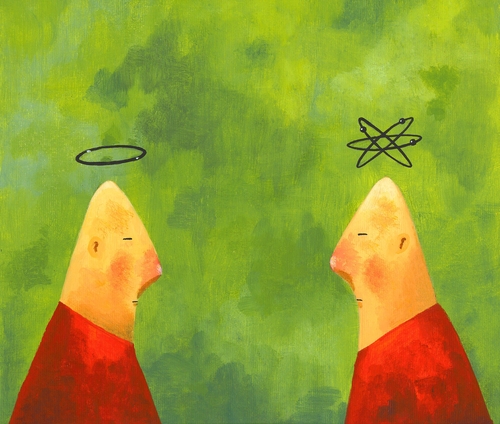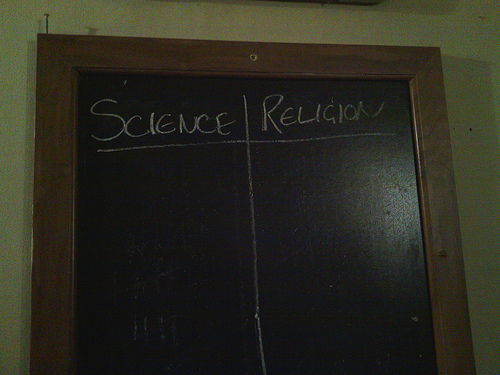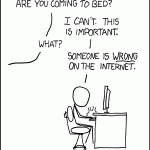“This isn’t right. It’s not even wrong.” That’s what Wolfgang Pauli, a pioneer of quantum mechanics, reportedly said after reviewing a particularly bad scientific paper. A writer in Scientific American once called it the “ne plus ultra put-down” in science1 because it manages to convey the intellectual frustration of confronting an idea that is not just incorrect, but so comprehensively misinformed that it makes any further discussion counterproductive.
|
This post is an excerpt from the new The Jesuit Post book, available right now on Kindle and on March 10th in paperback. The book features 20 new essays from writers for The Jesuit Post, as well as reprinting a few of the best essays from our first two years online. For more information, click here. |
 |
Pauli’s quip is what you say when even the exact opposite position is as inaccurate as the original claim. Correcting such not-even-wrong claims is like trying to climb out of a pit of quicksand: you expend monumental effort only to wind up in the same place you started.

Artist: Stephen Salinas
Though it may have been coined for a bad physics paper, here I want to adopt Pauli’s phrase in connection with a contemporary philosophical and theological problem which often claims scientific warrant: “New Atheism.” To be clear at the outset: there is no such thing as a monolithic “New Atheism” with any one set of arguments or claims (something it shares with the “religion” that it seeks to refute—a theism derived from Christianity which itself lacks any single, universal set of beliefs, other than some acknowledgment of God as creator).2 When I say “New Atheism,” I mean the set of aggressive denials of God’s existence that have risen to cultural prominence in the last decade or so, which claim that scientific evidence easily and obviously renders God unnecessary, improbable, and unbelievable.3
The New Atheism isn’t right. It’s not even wrong.
#
Because its claims are far from being right, it is tempting for those who know anything at all about theology to dispatch them quickly with corrections, as if swatting away flies (“No, that’s not how the argument from design works.” “Of course you can be a Christian and still accept evolution.” “But who made the laws of physics? Where do they come from?”—you get the picture). However, because New Atheism is not just not right but in fact not even wrong, these attempts have been, and continue to be, doomed to failure. The people who need to hear them aren’t listening, and because they tend to interpret even the most careful theological explanations as simply more irrational special pleading for religion, they often can’t listen.
At the same time, given the vast cultural interest it has generated, we must recognize the attractive power of the New Atheism. By now we can say it is not arguments that make New Atheism alluring—because its arguments are amateurish and unconvincing.4 Still, significant numbers of people want to be convinced by these arguments, and that is a phenomenon that deserves the very best of any believer’s attention. It’s the desire beneath that attraction that fascinates me.
Put differently, and contrary to the prevailing narrative, this is not primarily a matter of science putting religion on the ropes. Religion is not in trouble because scientific reason has unmasked it as mythology; religion is in trouble because many people want to be able to reject it, and New Atheism gives them a way to do so. It is the source of the science/religion tension, rather than its outcome, that is most interesting. This means that the primary challenge facing Christians ought to change with the problem. Today the task is not to answer the arguments of the New Atheism on their own grounds. Rather, we should ask what it is in Christianity that does such an effective job of making New Atheism attractive. Moreover, we need to be open to the possibility that this “no” to belief responds to distorted elements of Christian belief, elements that make faith seem ridiculous enough that the New Atheism appears to be the more rational option.
Still, perhaps my summary dismissal of New Atheist arguments is overly quick. In a nutshell, then, here’s why the New Atheism is “not even wrong”: because the God it rejects is not the God that believers actually, well, believe in—either naïvely or even when they think about it carefully. It is a laughably incoherent concept of the Divine that New Atheism argues against, one believers only affirm when the alternative seems to be denying God’s existence outright.
Painted into that corner, Christians can end up defending a god who is not God—or more precisely, defending certain claims about God as if they were the ground of faith, rather than its consequents, and the not-even-wrongness of the debate increases exponentially from there. The problem is that these defenses center on definitions of God as “creator,” “supreme being,” or “first cause,” which are abstractions on which most believers do not expend much time, effort, or thought. They pray, worship, and live their religious lives through community, ritual, and relationship.5 Does this belief in God meet the test of scientific reason, the New Atheists ask? The question is largely meaningless, since the claims made by such belief do not generally infringe upon areas of scientific competence. Do friendships meet the test of scientific reason? Do marriages and love for children? These are category errors, not meaningful questions. Meanwhile, those who have thought through their idea of God in more formal terms have ample resources to parry the objections of these most recent proponents of atheism.
Whatever other claims might be fairly leveled against it, Christian theology has at least avoided a concept of God so flimsy as to be easily disproved by evolutionary theory or the latest discoveries about matter and energy popping into existence out of the quantum vacuum. The God believed in and confessed over the course of theological history is—and has been, for centuries—far beyond these sorts of objections.6 This is not to say that these sorts of problems are silly or trivial, but rather to point out that they have been successfully understood and integrated into the way theology discusses God. In fact, the development of “scientific reason” itself can be traced in part to advances in philosophy and theology that allowed us to mark off certain sets of questions as amenable to purely empirical investigation.

Image: bora ozen / Shutterstock
Unfortunately, the proponents of the New Atheism do not seem especially interested in engaging religion in its most rational and well-articulated forms, where it has thought seriously about its relationship with science.7 Instead, treating all religion monolithically—a set of superstitious, mythical claims to be debunked—they respond to and reinforce a “not even wrong” understanding of theology itself: faith reduced to a set of dogmatic propositions that the believer holds to be true or false.8 New Atheist polemics are directed largely against a religion for which revelation is principally a source of explanations—the kind of religion described to us when we learned about Greek mythology. You remember: explaining the sound of thunder by reference to Zeus or Mount Etna’s eruptions by Typhon being trapped underneath it. A similar approach has appeared in some Christian circles, reading the book of Genesis as a just-so story of what God did while making everything. This model of religion is inadequate for understanding Greek mythology; it is worse than useless as applied to Christianity.
That said, the New Atheists aren’t alone in setting poor terms for the debate, as Christianity itself has defenders who seem eager to confirm the worst suspicions of the New Atheists, including those who insist on literal interpretations of scripture that fly in the face of science (and who then try to force those interpretations into school curricula or leverage them into the rejection of other scientific claims for political ends—as with global warming). Of the many things that could be said about this, I will confine myself to three. First, this is what happens when arguments over not-even-wrong claims get going—no amount of scientific evidence can convince a scriptural literalist, because the (scientific) method by which the evidence is obtained already belongs to the “enemy.”
Second, this is not a new problem. St. Augustine had cause in the fifth century to counsel against allowing an unbeliever “to hear a Christian, presumably giving the meaning of Holy Scripture, talking nonsense” on scientific topics such as the motion of the stars and the kinds and variety of animals.9 The danger Augustine was concerned with was not that the Christian would look foolish, but that the Christian would cause the Bible to appear foolish by offering an unnecessary and poorly informed interpretation in which scripture contradicted reality.
Third, and perhaps most important, there is an opportunity here for rational, non-fundamentalist Christians to make common cause with the defenders of science. In truth, they have even more reason than the New Atheists to reject such strained readings of scripture, because they not only prevent knowledge of science but also encourage an incoherent and even blasphemous view of God. A God who is so fragile as to require believers to imagine that perhaps fossils were created in situ, only appearing to be millions of years old, is scarcely worthy of the name. Worse yet, fear of scientific investigation amounts to a rejection of the gift of human intelligence and thus a disfiguring of the image of God in which human beings are made. Rational Christianity wants to, and does, celebrate science as among the human achievements that give glory to God. However, so long as the authority of science is claimed to require us to judge belief in God irrational in itself, very little progress can be made: We will remain stuck in the loop where one side thinks God is routinely overruling science while the other celebrates ignorance of theology. How can we get off the not-even-wrong merry-go-round?

Image: Flickr user Yewtree / Creative Commons
I propose that we start by asking why New Atheism is so attractive and convincing for some people, rather than whether it is correct per se. As a popular phenomenon, New Atheism does not succeed because of the cogency of its arguments, but because it offers an apparently convincing way to resolve a difficult question. The popularity of New Atheism tells us that there is both a fascination and a frustration with the persistent “problem of God.” On one hand, the fascination ought to give us hope as an echo of that restlessness that moves our hearts until they rest in God. On the other, the frustration requires our attention, because it reveals a considerable desire for a way simply to head off the problem by dismissing it at its source.
Most religious belief does not begin with philosophical and theological arguments for God’s existence. The broad popularity of New Atheism, despite its shoddy arguments, suggests that we can perhaps say much the same about unbelief. Something else is going on. New Atheism offers a rational justification for abandoning religion, which may serve to resolve more basic struggles that people have with religious claims. These must not be dismissed out of hand. They tell us that a significant number of people experience the claims of religion not only as oppressive, arbitrary, and irrational but further as offering no real good in exchange for the sacrifices demanded. It would be hubris to assume that this is principally a failure of understanding on the part of the nonreligious; we may in fact discover that they have a clearer view of some pathologies in lived Christian belief than those of us who are closer to them.
New Atheism succeeds because it tells people that their negative experience of religion and religious believers is exactly as it should be, because religion itself is just a pernicious side effect of the need for social control. Or that religion is a vestige of our tendency to detect agency in the world, or some other evolved capacity. It succeeds because it tells people that a God whose main purpose is to balance the metaphysical ledger and account for the beginning and design of things is scientifically unnecessary and more than a little crazy. Therefore, the argument goes, this God should not get to make demands about what we do with our Sunday mornings, much less what we do with our sexuality. It succeeds because it offers an apparent Ockham’s Razor-esque explanation of the hypocrisy of Christian moralizing: There was never anything real there to begin with, just stories to scare us into being good little boys and girls with the threat of hell. It succeeds because in the wake of clergy-abuse scandals and the church’s recent interventions in politics, it can seem that more public effort has been devoted to self-protection than to the service of others (which is exactly what one would predict if belief really is just a security blanket). New Atheism has traction because it offers people a way to reject a superficial shadow of Christianity, a self-satisfied, self-assured, and self-indulgent church; a lifeless zombie instead of the living Body of Christ.
And God knows—literally—that such a distortion of faith deserves rejection. We religious types too rarely admit this.
A common rhetorical trope among New Atheists is to claim that everyone living rejects most of the gods humanity has ever believed in, and they just go “one god further.” Richard Dawkins, making this point in a 2002 TED talk, defined an atheist as “just somebody who feels about Yahweh the way any decent Christian feels about Thor or Baal or the golden calf.” This is much like a religious person, upon hearing a strange conception of God, replying, “I don’t believe in that God, either.”
But I think Dawkins is on to something even deeper here, because the rejection is not just casual, the way we might dismiss Zeus as merely mythical. Passionate atheism is the rejection of a false God, not just an imaginary one. Perhaps much of contemporary atheism can be explained as the (mistaken) rejection of God as if he were merely an idol, or more bluntly, as the (proper) rejection of the idol called “God” (or “Jesus,” or “church,” or “Christian values”) that far too many Christians worship in place of the Living God.
The arguments of New Atheism may be “not even wrong,” but the underlying motive for accepting them—and this should give us pause—might just come from God. After all, idols are not to be tolerated, or even to be dismissed and disbelieved and set off to one side. They need to be unmade.
The true threat of an idol is not what it represents—because what it represents has no independent real existence—but what it obscures. To the degree that religious language, especially our claims about God, are heard merely as assertions of authority, to be believed simply because we say so or even because we say that God says so, they have become idols. They obstruct a deeper authentic relationship because they are limited to addressing God as the mere conclusion of our arguments, or as filtered through the “literal” meaning of scripture. That is the very definition of idolatry: a god we can dominate and deploy for our own purposes. Whether or not such a domesticated deity ought to be dismissed as nonexistent, it certainly ought to be rejected as unworthy of worship.
The challenge then becomes to announce the God who is worthy of worship, and careful arguments, while necessary, cannot be sufficient to that task. However grateful we are for those who tirelessly correct the theological ignorance of the New Atheists, however clear and convincing we can make our apologetics, neither of these can be the real solution—at least not if contemporary atheism is actually an allergic response to idolatry instead of the disease itself.
New Atheism is not right—but what is actually wrong is our feeble belief in a god cut down to the size of our own understanding rather than in God, the creator and redeemer of all that is, who is in love with and in search of his people. The answer is not to proclaim more loudly the “God” the New Atheism not-even-wrongly denies, but to confess more humbly and honestly our encounter with God who is greater than we can imagine.
— — — —
- Michael Shermer, “Wronger Than Wrong,” Scientific American, October 16, 2006. ↩
- No doubt the frustration in defining the “opponent” is mutual. ↩
- Whether or not New Atheism has a coherent intellectual identity is an interesting question, but one for another time. What it certainly does have is a public profile, and my interest here is in what that public profile tells us not about New Atheism itself but about the current situation of religious belief. ↩
- The philosophical and theological refutation of New Atheism has been, in a word, thorough; it has also been fairly thoroughly ignored by the New Atheists. I certainly do not wish to reproduce the whole sorry mess here. The best (shorter) starting place is probably Terry Eagleton’s devastating review of Richard Dawkins’s The God Delusion in the London Review of Books 28.20 (October 19, 2006): 32-34. For a more thorough and systematic discussion, a good starting point is John F. Haught’s God and the New Atheism: A Critical Response to Dawkins, Harris, and Hitchens (Louisville, KY: Westminster John Knox Press, 2008). ↩
- In general, the prominent New Atheist thinkers do not seem to spend much time or effort on “lived religion,” with the possible exception of evolutionary-psychology explanations of how a number of behaviors which then give rise to religion as a by-product could have come about as adaptations in response to selection pressure; see, for example, Steven Pinker’s 2004 address on receipt of “The Emperor’s New Clothes Award” from the Freedom from Religion Foundation. ↩
- The basic reason that God escapes these objections is because God is not one existing thing among others, but the very source and ground of existence. Put another way, Christian theology recognizes that when we ask “why” and “how” questions about the totality of existence itself, we are operating on a much different level than when we ask about how stellar fusion works, or why we have opposable thumbs, or even what conditions were like during the Big Bang. When Christian theology asks after a designer, it seeks not the one who scripted the events of evolution but the one who designed existence itself such that evolution could occur; when it reflects on a creator, it seeks not the first thing that popped into existence out of a vacuum but the very reason for the vacuum itself existing at all. ↩
- Richard Dawkins, for instance, recently commented on Twitter, “I’m told theology is outside my field of expertise. But is theology a ‘field’ at all? Is there anything in ‘theology’ to be expert ABOUT?” (April 16, 2013). Lawrence Krauss, author of A Universe from Nothing: Why There Is Something Rather Than Nothing, when pushed in an interview to acknowledge that the “nothing” from which he argues the universe arises is in fact not “nothing” in the sense that a philosopher or theologian means it (because it has a “something” consisting of the laws of physics), replied, “But I don’t really give a damn about what ‘nothing’ means to philosophers; I care about the ‘nothing’ of reality. And if the ‘nothing’ of reality is full of stuff, then I’ll go with that.” See Ross Andersen, “Has Physics Made Religion and Philosophy Obsolete?” The Atlantic (April 23, 2012). Krauss does at least bother to understand the objection; he just rejects it as uninteresting—which delivers us back to the problem of how to respond to New Atheist claims other than by correcting their mistakes. ↩
- Another version of this essay is likely possible, in which the blame for starting the “not even wrong” cycle would be laid at Christianity’s door for the conditions in which fundamentalism arose. ↩
- Augustine of Hippo, The Literal Meaning of Genesis, 1.19.39. ↩












